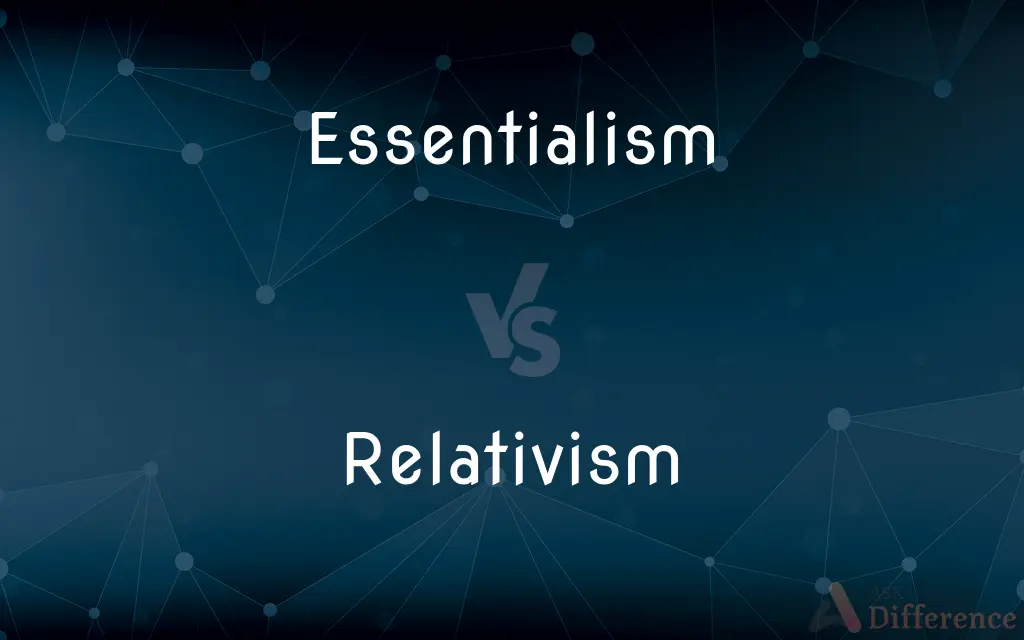Essentialism vs. Relativism — What's the Difference?
Edited by Tayyaba Rehman — By Fiza Rafique — Published on December 22, 2023
Essentialism asserts that things have a set nature or essence. Relativism posits that perspectives and values are relative to differences in perception and consideration.

Difference Between Essentialism and Relativism
Table of Contents
ADVERTISEMENT
Key Differences
Essentialism holds that categories of objects or people have an inherent quality or essence that makes them what they are. When we talk about a certain category in terms of essentialism, we assume there are set characteristics that define it, regardless of external factors. Relativism, on the other hand, is a philosophy that suggests that individual points of view have no absolute truth or validity, and they only hold validity in relation to other points of view.
When considering cultural practices, essentialism might argue that a culture has intrinsic traits that are timeless and don't change. Relativism would counter this by suggesting that understanding of a culture can only be achieved in relation to one's own cultural context, and there's no absolute standard by which to judge another culture.
In the realm of morality, essentialism might assert that there are fixed moral truths that apply universally. Relativism, however, would argue that morals are relative to cultural, societal, historical, or personal circumstances. There isn't a single moral truth, but many that vary based on context.
The debate between essentialism and relativism is deep-rooted in philosophy, sociology, and anthropology. Essentialism provides a stable ground, a sense of fixed nature to things or ideas. Relativism challenges this by emphasizing the importance of perspective, context, and individual experience.
Comparison Chart
Definition
Belief in inherent qualities or essences.
Belief that truth is relative to individual perspectives.
ADVERTISEMENT
Application
Universal traits in categories.
Contextual understanding of categories.
Truth
Absolute.
Relative.
Stance on Morality
Fixed moral truths.
Morals vary based on context.
Dependence on Perspective
Not influenced by external perspectives.
Entirely dependent on varying perspectives.
Compare with Definitions
Essentialism
The philosophy that categories possess intrinsic traits.
Essentialism in art can sometimes stifle creativity and innovation.
Relativism
The idea that values or truths are not fixed but are relative.
Some see relativism as a barrier to establishing global human rights standards.
Essentialism
The belief in inherent, unchanging characteristics.
Many criticize gender essentialism for oversimplifying complex identities.
Relativism
The belief that truth or morality is not absolute but varies with perspective.
Cultural relativism argues that one cannot judge a culture outside of its own context.
Essentialism
The idea that things have an essence or core being.
The concept of human nature is often debated in the realm of essentialism.
Relativism
The view that understanding is context-dependent.
His stance on moral relativism sparked many debates in the classroom.
Essentialism
The view that entities have a set nature that defines them.
Some argue that essentialism in biology can be limiting.
Relativism
A philosophy suggesting no viewpoint has a final truth.
Relativism challenges the assertion of universal standards in aesthetics.
Essentialism
The assertion of universal truths or properties.
His approach to teaching was rooted in academic essentialism.
Relativism
The stance that judgments are based on individual perspectives.
She argued that scientific relativism might hinder objective discoveries.
Essentialism
The philosophical tenet that objects and classes of objects have essential and not merely accidental characteristics.
Relativism
The theory that value judgments, as of truth, beauty, or morality, have no universal validity but are valid only for the persons or groups holding them.
Essentialism
(philosophy) The view that objects have properties that are essential to them.
Relativism
The theory, especially in ethics or aesthetics, that conceptions of truth and moral values are not absolute but are relative to the persons or groups holding them.
Essentialism
(sociology) The view that all members of certain groups of people (such as those with the same race, gender, age, or sexual orientation) have common, essential traits inherent to the defining feature of the group; (also) behavior or statement(s) that reflect such a view.
Relativism
A specific such theory, advocated by a particular philosopher or school of thought.
Essentialism
(education) The doctrine that there are certain traditional concepts, values, and skills that are essential to society and should be taught to all students.
Relativism
(philosophy) the philosophical doctrine that all criteria of judgment are relative to the individuals and situations involved
Essentialism
A lifestyle that seeks to minimize nonessentials in order to focus on what is important.
Essentialism
(philosophy) The theory that human beings are by nature (i.e. essentially) good and that evil is the product of society.
Common Curiosities
Can essentialism apply to cultural identities?
Yes, but it might oversimplify them by attributing fixed traits to entire cultures.
How does relativism affect our understanding of other cultures?
Relativism suggests we understand cultures in relation to our own context and not judge them by absolute standards.
How might relativism impact debates on human rights?
Relativism could challenge the idea of universal human rights, suggesting rights might vary based on cultural or societal contexts.
What does essentialism claim about categories or objects?
Essentialism asserts that categories or objects have inherent, unchanging qualities that define them.
How does relativism view truth or morality?
Relativism believes that truth or morality is not absolute and varies based on individual or cultural perspectives.
Can relativism be applied to scientific truths?
While science seeks objective truths, discussions about the nature of these truths can be influenced by relativistic ideas.
Is essentialism fixed and unchanging?
Essentialism asserts that certain traits or characteristics are fixed and inherent to categories or objects.
How does essentialism view human nature?
Essentialism would argue that there are universal traits inherent to all humans.
Can essentialism and relativism coexist?
While they represent different viewpoints, in some discussions, elements of both can be present.
In what areas is relativism most prominently discussed?
Relativism is often discussed in areas like ethics, anthropology, and cultural studies.
Which philosophy, essentialism or relativism, dominates modern sociology?
Both have influence, but many sociologists are cautious of over-essentializing groups while acknowledging some universal patterns.
How does essentialism view art?
Essentialism might assert that there are intrinsic standards or traits that define good art.
Does relativism mean that all perspectives are equally valid?
Relativism posits that truths are relative, but it doesn't necessarily claim all perspectives are of equal validity.
How do essentialism and relativism affect education?
Essentialism might advocate for a fixed curriculum, while relativism might encourage contextual understanding and multiple perspectives.
How might essentialism impact gender discussions?
Essentialism might posit that genders have fixed traits, which can be seen as limiting or oversimplifying by critics.
Share Your Discovery

Previous Comparison
Undefined Slope vs. Zero Slope
Next Comparison
Ammonia vs. Ammonium HydroxideAuthor Spotlight
Written by
Fiza RafiqueFiza Rafique is a skilled content writer at AskDifference.com, where she meticulously refines and enhances written pieces. Drawing from her vast editorial expertise, Fiza ensures clarity, accuracy, and precision in every article. Passionate about language, she continually seeks to elevate the quality of content for readers worldwide.
Edited by
Tayyaba RehmanTayyaba Rehman is a distinguished writer, currently serving as a primary contributor to askdifference.com. As a researcher in semantics and etymology, Tayyaba's passion for the complexity of languages and their distinctions has found a perfect home on the platform. Tayyaba delves into the intricacies of language, distinguishing between commonly confused words and phrases, thereby providing clarity for readers worldwide.
















































